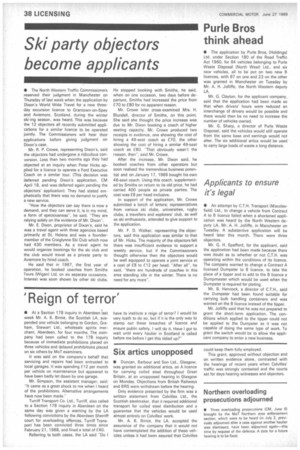Ski party objectors become applicants
Page 40

If you've noticed an error in this article please click here to report it so we can fix it.
• The North Western Traffic Commissioners reserved their judgment in Manchester on Thursday of last week when the application by Dixon's World Wide Travel for a new threeday excursion licence to Grantown-on-Spey and Aviemore. Scotland, during the winter ski-ing season, was heard. This was because the 12 objectors all recently submitted applications for a similar licence to be operated jointly. The Commissioners will hear their applications before giving judgment on Dixon's case.
Mr. R. P. Crowe, representing Dixon's, said the objectors had undergone a ridiculous conversion. Less than two months ago they had objected at an inquiry when Peter Hicks applied for a licence to operate a Ford Executive Coach on a similar tour. (This decision was deferred pending Dixon's application, CM April 18, and was deferred again pending the objectors' application). They had stated emphatically that there was no demand to justify a new service.
"How the objectors can say there is now a demand, and they can serve it, is in my mind, a form of speciousness", he said. "They are relying solely on the evidence of Mr. Dixon".
Mr. E. Dixon, proprietor of Dixon's, said he was a travel agent with three agencies based primarily at St. Helens and was a foundermember of the Craiglynne Ski Club which now had 430 members. As a travel agent he would organize bookings for the ski club and the club would travel as a private party to Aviemore by hired coach.
He said that in 1967, the first year of operation, he booked coaches from Smiths Tours Wigan) Ltd. on six separate occasions. Interest was soon shown by other ski clubs. He stopped booking with Smiths, he said, when on one occasion, two days before departure, Smiths had increased the price from £70 to £80 for no apparent reason.
Mr. Crowe later cross-examined Mrs. H. Blundell, director of 'Smiths, on this point. She said she thought the price increase was due to Mr. Dixon booking a coach of higher seating capacity. Mr. Crowe produced two receipts in evidence, one showing the cost of hiring a 49-seat coach as £70, the other showing the cost of hiring a similar 49-seat coach as £80. "That obviously wasn't the reason, then", said Mr. Crowe.
After the increase, Mr. Dixon said, he booked coaches from other operators but soon realized the tremendous business potential and on January 17, 1969 bought his own 46-seat coach. Using this coach, supplemented by Smiths on return to its old price, he had carried 400 people as private parties. The cost was £8 per head inclusive.
In support of the application, Mr. Crowe submitted a batch of letters; representatives from various ski clubs, universities, rugby clubs, a travellers and explorers' club, as well as ski enthusiasts, attended to give support to the application.
Mr. F. D. Walker. representing the objectors, said this application was similar to that of Mr. Hicks. The majority of the objectors felt there was insufficient evidence to support a weekly service, but if the Commissioners thought otherwise then the objectors would be well equipped to operate a joint service at a cost of £8 to £12 per head. "After all", he said, -there are hundreds of coaches in this area standing idle in the winter, There is no need for any more".


















































































































